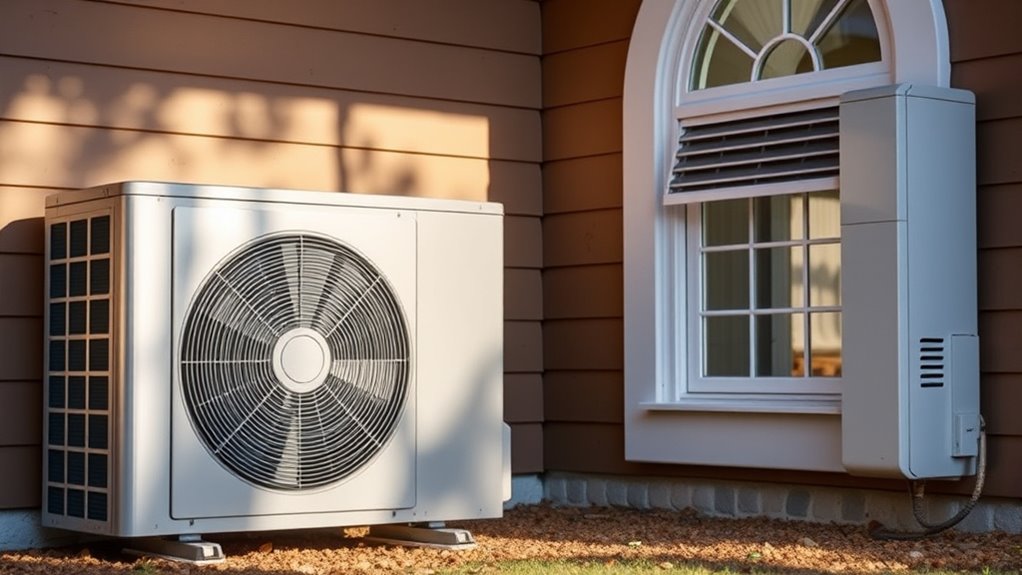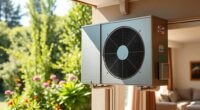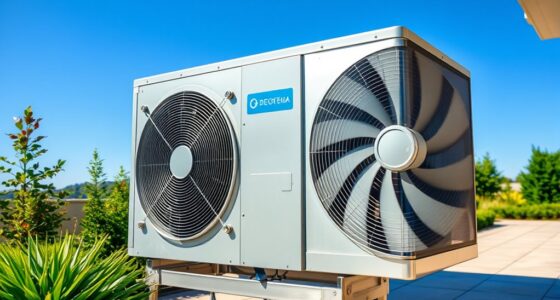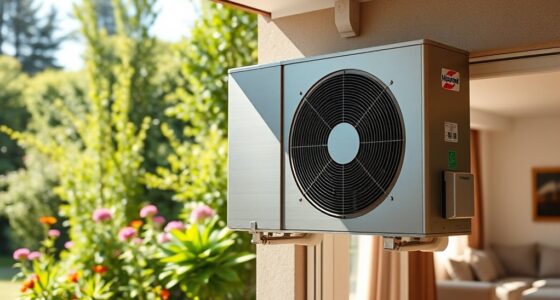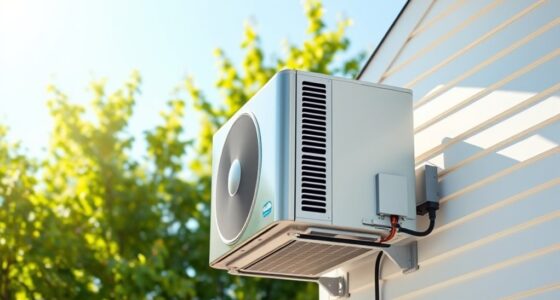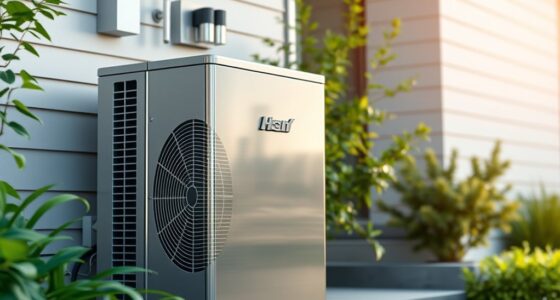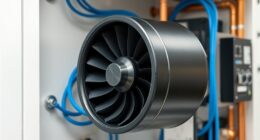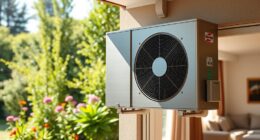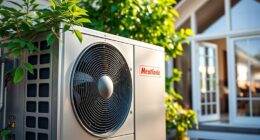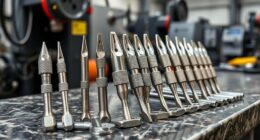Heat pumps are typically quieter than traditional air conditioners thanks to advanced compressor technology, vibration dampening features, and smart soundproofing materials. Modern heat pumps operate around 50-55 decibels, similar to a quiet conversation, while older or basic AC units can be louder, often exceeding 60 decibels. Their improved design reduces vibrations and noise during operation, making them more comfortable for your home. If you explore further, you’ll discover how these innovations truly create a peaceful environment.
Key Takeaways
- Modern heat pumps operate at noise levels around 50-60 dB, similar to a quiet conversation, and often quieter than traditional AC units.
- Heat pumps utilize variable-speed compressors and sound-dampening materials to reduce operational noise significantly.
- Traditional AC units typically produce higher noise levels, often exceeding 60 dB, due to less advanced sound attenuation technologies.
- Proper installation and vibration-isolating components in heat pumps further minimize noise transmission compared to older or standard AC systems.
- Overall, heat pumps are generally quieter than traditional ACs, enhancing indoor comfort and reducing outdoor noise disturbance.
How Heat Pumps Achieve Quiet Operation Through Advanced Compressor Technology
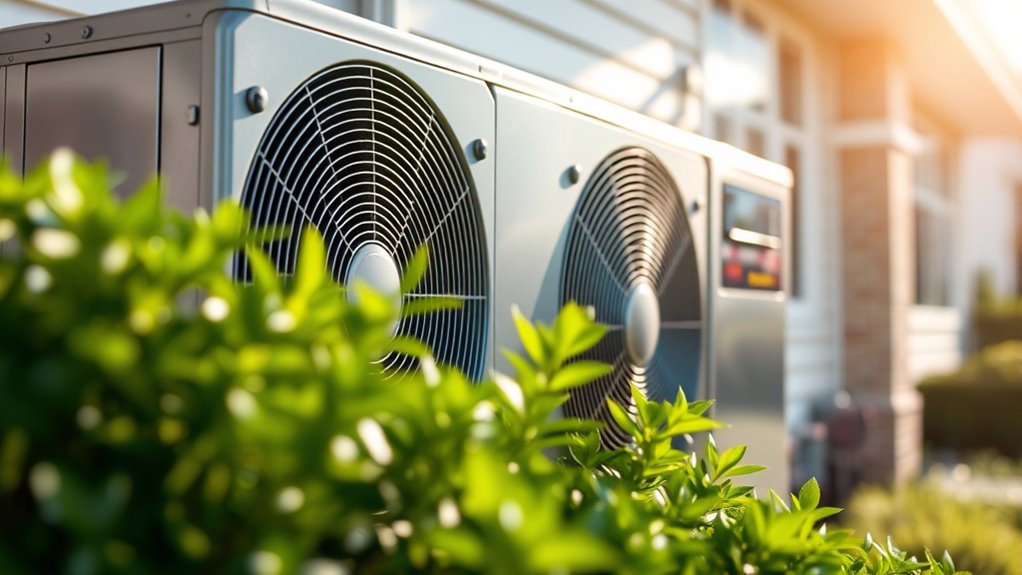
Heat pumps achieve quiet operation primarily through the use of advanced compressor technology. Variable-speed compressors, driven by inverter technology, adjust their speed to maintain steady airflow, which reduces noise fluctuations. Their innovative compressor design incorporates sound-dampening materials and vibration isolation mounts, further lowering operational noise. These features help minimize noise emissions by dampening vibrations and sound waves. Many models include insulated compressor compartments that contain sound better and prevent noise escape. Smart control systems optimize compressor performance, decreasing unnecessary cycling during low-demand periods, which cuts down noise even more. Additionally, the use of sound-dampening materials, such as acoustic insulation, enhances noise reduction and contributes to a quieter environment. All these elements work together to deliver a quieter experience, making heat pumps especially less disruptive than traditional units. You benefit from reduced noise, especially during normal operation, thanks to these advanced noise-reduction features.
Comparing Noise Levels Between Heat Pumps and Traditional Air Conditioners

When comparing noise levels, modern heat pumps generally operate more quietly than traditional air conditioners. Heat pumps typically produce operation noise between 50-60 decibels, comparable to a quiet conversation, thanks to sound insulation and sound-dampening technology. The outdoor unit is usually the loudest part, but advanced models feature sound insulation to keep noise emissions below 55 decibels. High-end heat pumps with variable-speed compressors are even quieter during operation. Additionally, advancements in AI-driven noise reduction technologies are beginning to further improve the noise levels of HVAC systems. In contrast, traditional air conditioners can generate similar or slightly higher noise levels, often lacking the sound-dampening features of modern heat pumps. Proper installation and regular maintenance help minimize air conditioning noise for both systems, ensuring quieter operation over time. Enhanced soundproofing techniques in newer models contribute significantly to reducing operational noise. As technology continues to evolve, smart HVAC systems are integrating noise management features to optimize comfort and quietness. Overall, heat pumps offer a notable advantage in quiet operation, especially for noise-sensitive environments.
The Role of Ductwork and Outdoor Units in Noise Generation
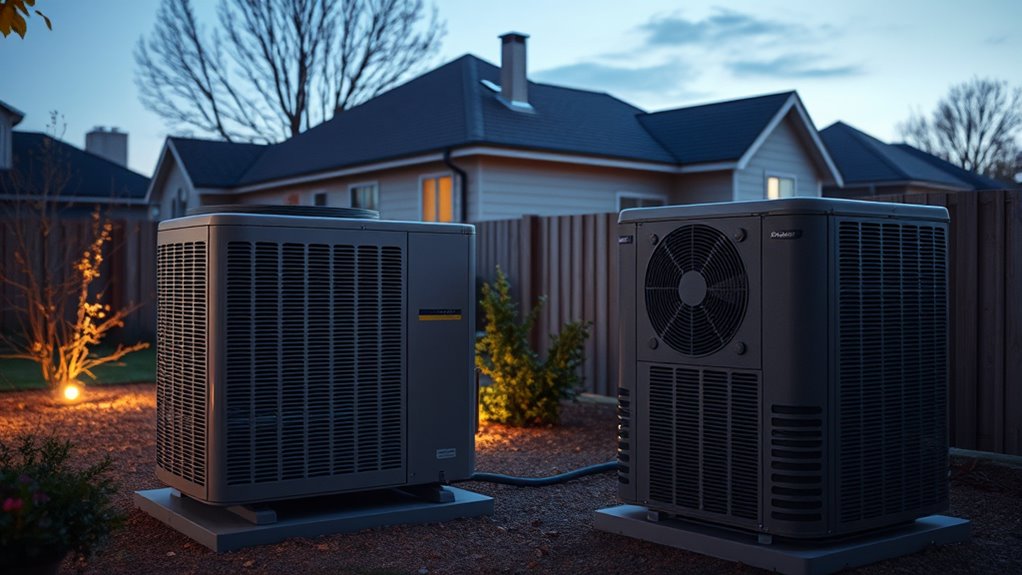
The outdoor units of heat pumps and traditional ACs generate noise through vibrations, fans, and compressors. These sounds can travel through ductwork, increasing noise inside your home. Proper placement and installation can help minimize this noise transmission and keep your space quieter. Additionally, using fabric decorating markers on surrounding surfaces can help absorb sound and reduce echo, further contributing to a quieter environment. Incorporating sound-absorbing materials like acoustic panels can also enhance noise reduction efforts. Recognizing the importance of sound transmission in overall noise control can lead to more effective solutions. Understanding sound attenuation techniques is essential for optimizing indoor comfort and minimizing disturbance. Addressing soundproofing strategies can significantly improve the acoustic comfort in your living space.
Outdoor Unit Vibrations
Vibrations from the outdoor units of heat pumps and traditional air conditioners are a primary source of operational noise, and these vibrations can be amplified throughout your home via ductwork. The compressor and fans in outdoor units generate vibrations that transfer through mounting points and external environmental factors like wind, increasing noise levels. Proper outdoor placement and isolation are essential to reduce structural transmission of vibrations into your home. Using vibration pads or anti-vibration mounts can markedly dampen these vibrations. To better understand, here’s a quick comparison:
| Feature | Impact on Noise |
|---|---|
| Outdoor placement | Minimizes transmission through structure |
| Vibration pads/ mounts | Reduce vibrations from compressor and fans |
| External environmental factors | Wind increases vibrations and noise |
Effective mounting and placement help keep outdoor unit vibrations—and noise—at bay. Additionally, dampening techniques can further diminish noise transmission and improve overall operation quietness.
Fan and Compressor Noise
Fan and compressor noise are the main sources of sound from heat pumps, especially since these components run continuously during heating and cooling. The outdoor units, housing the compressor and fan, generate sound levels typically between 50-60 decibels—comparable to a quiet conversation. Modern models incorporate sound-dampening technology and variable-speed compressors to reduce noise during operation. Proper installation plays a essential role in minimizing vibration, which can amplify noise. Additionally, ongoing research in AI Security aims to develop smarter noise reduction techniques and monitoring systems for HVAC units. Consider these factors: – Vibration isolation and sound barriers lower noise from outdoor units – Well-maintained fans operate more quietly – Sound-dampening features in newer models reduce decibels – Installation quality directly impacts noise levels during operation Proper installation techniques are crucial for ensuring optimal noise reduction and overall system performance. Understanding how these elements influence noise helps you choose quieter, more efficient heat pumps. Moreover, noise mitigation strategies are continually evolving to further enhance the quiet operation of modern heat pumps, benefiting both residential and commercial users. An emerging area in sound design involves integrating advanced sensors and adaptive algorithms to dynamically adjust noise levels based on ambient conditions. Additionally, implementing dampening materials can further absorb vibrations and reduce overall noise output.
Ductwork Sound Transmission
Ductwork plays a crucial role in how noise from a heat pump spreads throughout your home, often amplifying the perceived sound levels in different rooms. Noise transmission occurs when sound travels through the duct system, making quiet indoor units seem louder. Proper soundproofing and insulation in ductwork can greatly reduce this transmission, improving acoustics and lowering overall noise levels. The design and installation of duct systems, including material choice and layout, are essential for effective sound-dampening. High-quality heat pumps often feature advanced soundproofing technologies integrated into both the outdoor unit and duct connections. Additionally, understanding sound transmission pathways can help in designing more effective noise mitigation strategies. Using soundproofing materials in ductwork can significantly reduce noise leakage, creating a more peaceful indoor environment. Incorporating sound absorption techniques can further enhance noise control and comfort in your living space. Properly sealing and insulating duct joints can prevent sound leaks and improve overall noise reduction efforts. Recent innovations in noise reduction technology have made it easier to achieve quieter operation. By focusing on these elements, you can minimize sound leakage, ensuring your heat pump operates quietly and comfortably within your living space.
Technological Innovations That Reduce Operational Sound in Modern Heat Pumps
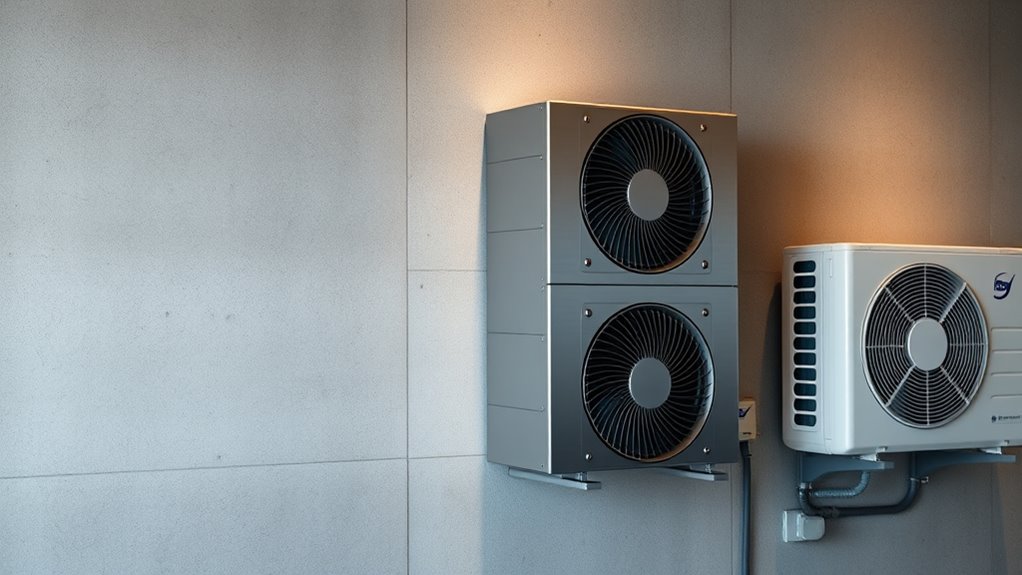
Modern heat pumps have made significant strides in reducing operational noise through innovative technologies. You’ll notice quieter operation thanks to variable-speed compressors and inverter technology, which adjust speed for lower, more efficient noise levels. Advanced sound-dampening materials and insulated enclosures in outdoor units further minimize sound. Technological innovations like digitally controlled fans and vibration isolation mounts prevent mechanical vibrations from creating noise. Improved refrigerant flow management and compressor design ensure smoother startup and shutdown, decreasing sudden noise disturbances. These advancements keep noise levels around 50-60 decibels, comparable to a quiet conversation. Additionally, noise levels are carefully monitored and controlled to maintain a comfortable indoor environment, with some units incorporating sound-dampening technology to further enhance quiet operation. Incorporating regulation standards ensures these units meet safety and environmental guidelines, further improving their performance and reliability. The integration of smart controls also allows for more precise operation, reducing unnecessary noise during periods of low demand. Furthermore, ongoing research into acoustic insulation materials continues to enhance the quietness of future heat pump models.
Installation Factors That Influence Noise Levels of HVAC Systems
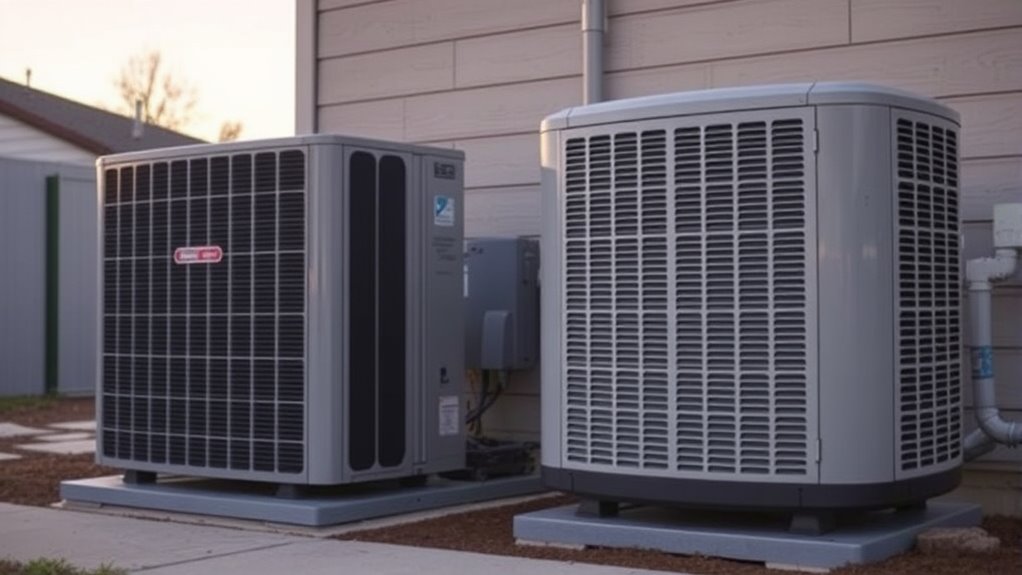
You can reduce noise by carefully choosing where to place your outdoor unit, like using vibration-absorbing pads or wall brackets. Regular maintenance, such as cleaning and tightening components, also helps keep noise levels down. Keep in mind that surrounding surfaces and obstructions can amplify sound, so consider these factors during installation. Additionally, understanding home security system options can help ensure your HVAC setup doesn’t compromise your property’s safety or peace. Incorporating best airless paint sprayers into your planning can also minimize disruptions during maintenance or upgrades, ensuring a quieter environment.
Outdoor Unit Placement
Where you place the outdoor unit can make a significant difference in noise levels inside your home. Proper outdoor unit placement reduces noise transfer and fan strain, enhancing overall quietness. Consider installing the unit on vibration-isolating brackets or a sound-absorbing pad to dampen vibrations and minimize noise. Keep the installation location away from bedrooms, patios, and areas with high environmental noise. Adequate airflow clearance—at least 12-24 inches—ensures proper ventilation and reduces fan noise. Using longer refrigerant lines can also decrease perceived noise inside your home. Additionally, choose a location that leverages noise dampening features, such as natural barriers or sound barriers, to further lessen disturbance. Well-placed outdoor units promote quieter operation and greater comfort.
System Maintenance Practices
Proper maintenance of your HVAC system plays a crucial role in controlling noise levels. Regular system upkeep guarantees the fan, coils, and worn components stay in good condition, reducing unnecessary noise. Cleaning the fan and coils prevents debris buildup, which can cause rattling or vibrations. Replacing filters and inspecting for worn parts also contribute to noise reduction. Professional installation is essential, as it assures proper setup and vibration dampening. Conduct routine inspections to identify issues early. Additionally, choosing systems with features like vibration isolation and sound-dampening enhances quiet operation. Proper maintenance not only minimizes noise but also extends your system’s lifespan and efficiency.
| Maintenance Task | Impact on Noise Level |
|---|---|
| Cleaning fan and coils | Reduces rattling and vibrations |
| Replacing worn components | Prevents mechanical noise |
| Professional installation | Ensures vibration dampening |
| Regular inspection | Detects issues early, minimizes noise |
Maintenance Practices for Ensuring Quiet and Efficient System Performance
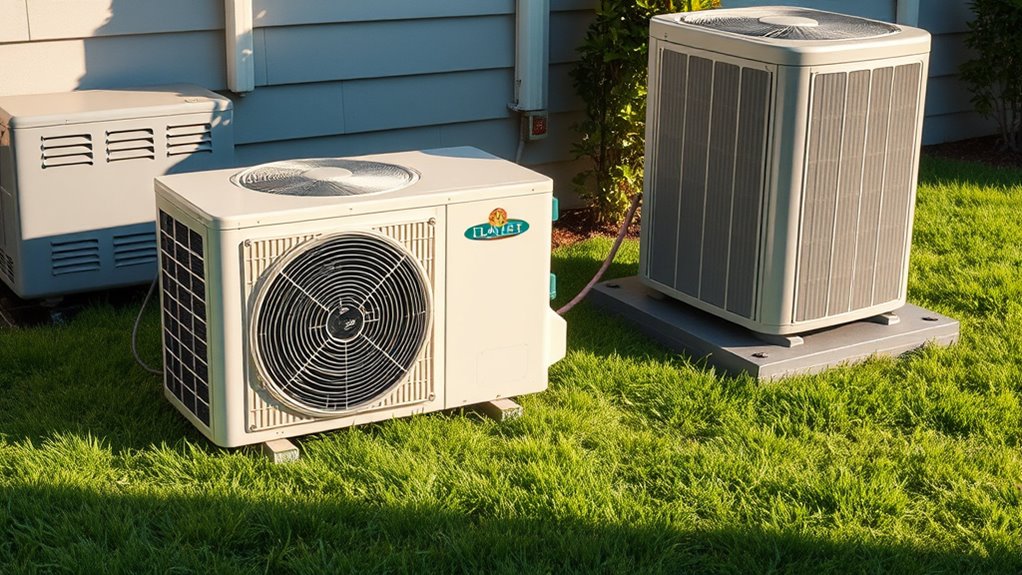
Regular maintenance is essential for keeping heat pumps and traditional air conditioners running quietly and efficiently. Proper maintenance ensures your system operates smoothly and noise is minimized. Regular cleaning of filters and coils reduces strain on the compressor, lowering operational noise. When your system is installed by a qualified technician, vibrations decrease, and noise during operation diminishes. Scheduling professional checks twice a year helps identify loose or worn parts before noise becomes problematic. Using sound-dampening enclosures or vibration pads can further absorb vibrations. Additionally, keeping fan blades and compressor components clean prevents imbalance that causes noise during startup and operation. Consistent maintenance not only improves noise reduction but also sustains ideal system performance, prolonging your unit’s lifespan and ensuring quiet, efficient comfort year-round.
Noise Levels During Peak Operation: Heat Pumps Versus Conventional ACs

During peak operation, both heat pumps and traditional air conditioners produce similar noise levels, typically ranging from 50 to 60 decibels—about the volume of a quiet conversation. The sound output mainly comes from outdoor units, where compressor noise and fan sounds are consistent. Modern HVAC technology has improved noise reduction, with high-end heat pumps incorporating sound-dampening features and variable-speed compressors that lower noise levels compared to older models. Proper installation, including vibration isolation and strategic placement, considerably minimizes operational noise for both systems. Here’s a comparison:
| Aspect | Heat Pumps | Traditional AC |
|---|---|---|
| Peak noise levels | Usually 50-60 dB, quieter with tech | Similar, sometimes louder |
| Outdoor units | Vibration isolation improves sound | Similar outdoor unit design |
| Compressor noise | Reduced in modern models | Consistent, higher in older units |
| Noise reduction tech | Present in high-end models | Less advanced |
| Overall sound output | Slightly quieter in newer heat pumps | Comparable, sometimes louder |
User Experience: How Quiet Operation Enhances Home Comfort
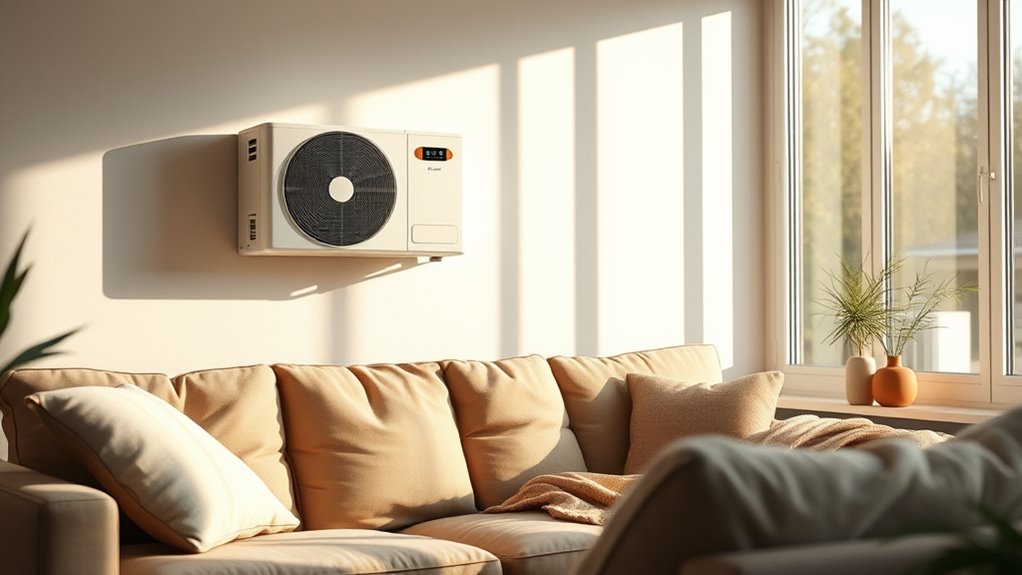
The quiet operation of heat pumps considerably boosts home comfort by creating a peaceful environment. With lower noise levels, you can enjoy a serene home, especially during nighttime or in noise-sensitive neighborhoods. Advanced models incorporate sound-dampening technologies like insulated compressor enclosures and variable-speed compressors that cut down on operational noise. Proper installation using vibration-absorbing pads helps further reduce vibrations and the compressor hum, enhancing indoor comfort. During milder weather, heat pumps run even more quietly, allowing you to relax without disruptive sounds. This quiet operation transforms your indoor environment into a tranquil space, making everyday activities more enjoyable and your home a true sanctuary.
- Reduced noise levels improve overall home comfort
- Sound-dampening technologies minimize operational sounds
- Vibration-absorbing pads lessen vibrations and hum
- Milder weather enhances the quiet operation of advanced models
Future Trends in Quiet HVAC Technology and System Design
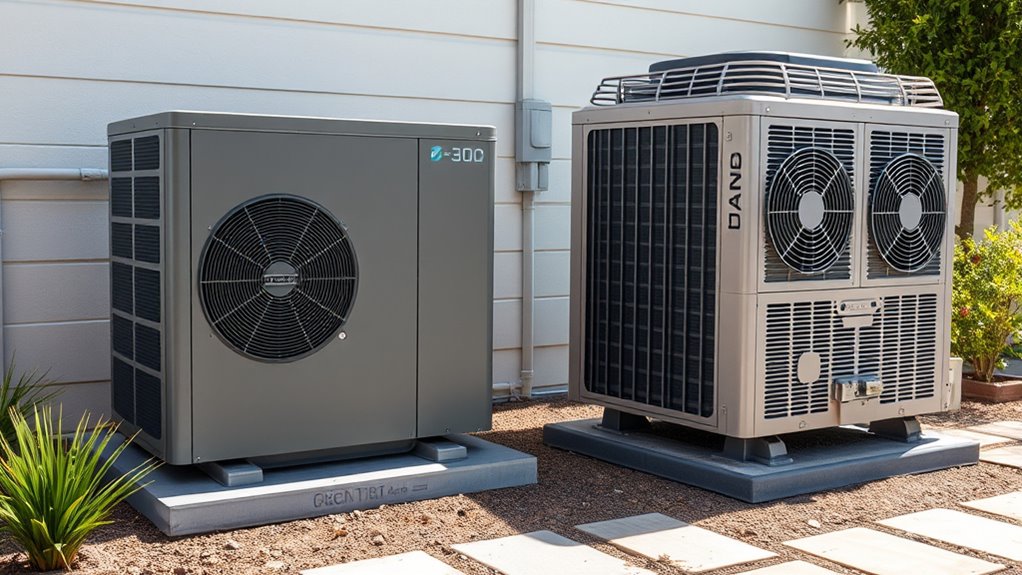
Advancements in inverter-driven compressors and sound-dampening materials are leading to quieter HVAC systems that operate at noise levels as low as 50 decibels, comparable to a library. Future HVAC designs incorporate smart technology and adaptive noise-cancellation, reducing operational sound during heating and cooling. Innovations in refrigerant technology and vibration control make outdoor units operate smoothly and quietly, even at peak capacity. Modular, sound-insulated enclosures further diminish noise transmission indoors. Additionally, IoT noise monitoring allows real-time noise management, enhancing user comfort and system longevity. These trends, driven by acoustic engineering and noise-reduction strategies, promise a future where quiet operation becomes standard across HVAC systems.
| Feature | Benefit |
|---|---|
| Sound-dampening materials | Noise reduction |
| Acoustic engineering | Enhanced noise control |
| IoT noise monitoring | Real-time noise management |
| Modular enclosures | Quieter outdoor units |
| Vibration control | Smoother, quieter operation |
Frequently Asked Questions
Are Heat Pumps Quieter Than Air Conditioners?
You might wonder if heat pumps are quieter than air conditioners. Generally, modern heat pumps operate at noise levels similar to or even quieter than traditional AC units, especially with newer models featuring sound-dampening technology and variable-speed compressors. Proper installation and maintenance also help reduce noise. Overall, advancements in HVAC tech mean you can enjoy effective cooling and heating without much noise, making heat pumps a quiet choice.
Are Heat Pumps Noisy for Neighbors?
You might think heat pumps are loud enough to wake the neighbors, but that’s not true! Modern heat pumps are so quiet, they’re like a whisper or a soft conversation, barely noticeable. Thanks to advanced sound-dampening tech and smart installation, their noise levels stay well below disruptive. So, when you choose and maintain a quality model, you’ll enjoy cozy comfort without disturbing anyone nearby.
What Is the Quiet Mode on a Heat Pump?
The quiet mode on a heat pump is a setting that lowers the compressor and fan speeds, making it operate more quietly. When you activate it, you’ll notice a reduction of about 10-15 decibels, helping to minimize noise during sleep or in noise-sensitive areas. This mode allows you to enjoy comfort without disturbing your surroundings, especially at night or in quiet environments.
What Is the Downside of a Heat Pump?
You should know that heat pumps have some downsides. Their efficiency drops markedly in very cold weather, so you might need additional heating sources. They also cost more upfront and can be noisier, especially from the outdoor unit. Maintenance and repairs tend to be pricier due to their complex systems. Plus, in extremely cold climates, they might struggle to keep your home warm without auxiliary heating.
Conclusion
Imagine your home as a peaceful sanctuary, where your heat pump hums softly like a gentle breeze whispering through trees. Thanks to advanced technology and thoughtful design, you can enjoy comfort without the noise of traditional ACs. Like a quiet guardian, your heat pump works diligently behind the scenes, ensuring tranquility and efficiency. Embrace this serene harmony in your home, where innovation quietly transforms your everyday comfort into a soothing, almost silent retreat.
